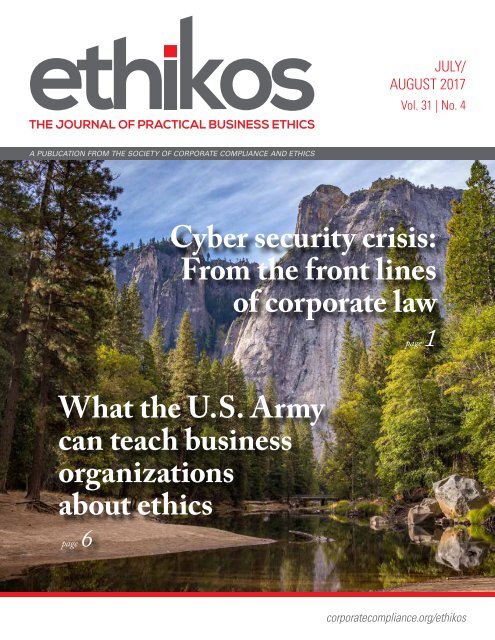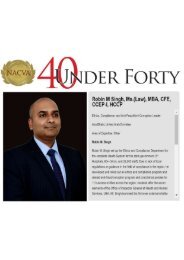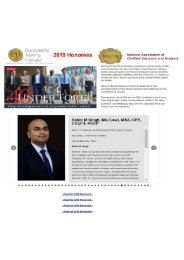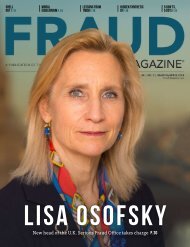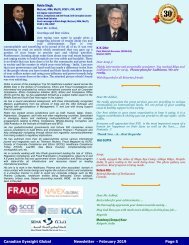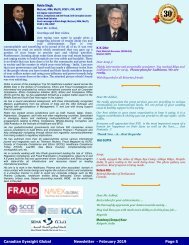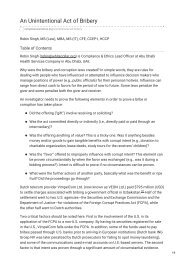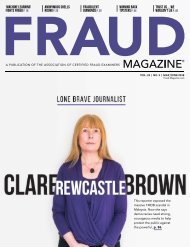Can Ethics be Monitored?
1. Can ethic be monitored? 2. Is business ethics governed by society? 3. What role does professional surrounding make on one's ethics? 4. Why are frauds committed? by #RobinSingh the #whitecollarinvestigator
1. Can ethic be monitored?
2. Is business ethics governed by society?
3. What role does professional surrounding make on one's ethics?
4. Why are frauds committed? by #RobinSingh the #whitecollarinvestigator
Create successful ePaper yourself
Turn your PDF publications into a flip-book with our unique Google optimized e-Paper software.
THE JOURNAL OF PRACTICAL BUSINESS ETHICS<br />
JULY/<br />
AUGUST 2017<br />
Vol. 31 | No. 4<br />
A PUBLICATION FROM THE SOCIETY OF CORPORATE COMPLIANCE AND ETHICS<br />
Cy<strong>be</strong>r security crisis:<br />
From the front lines<br />
of corporate law<br />
page 1<br />
What the U.S. Army<br />
can teach business<br />
organizations<br />
about ethics<br />
page 6<br />
corporatecompliance.org/ethikos
<strong>Can</strong> ethics <strong>be</strong> monitored?<br />
BY ROBIN SINGH<br />
W<br />
hat is ethics?<br />
There is no standard definition of the word ethics.<br />
The Macmillan Dictionary descri<strong>be</strong>s ethics as a set of<br />
principles that tell people what is right and wrong. This is remarkably<br />
similar to the definition for morality, except that morality is<br />
about what society considers to <strong>be</strong> right and wrong. <strong>Ethics</strong> is more<br />
personal, and <strong>be</strong>cause every person thinks differently, his/her ethics<br />
could <strong>be</strong> different from the next person.<br />
But broadly speaking, it is about putting others first, above self.<br />
Professional/workplace ethics is easier. There wouldn’t <strong>be</strong> many<br />
people, if any at all, who think it is ethical for a doctor to prescri<strong>be</strong><br />
the drugs of a manufacturer that pays for his vacation. For a lot<br />
of business practices, high ethical standards are accepted by many<br />
without question, mostly <strong>be</strong>cause they agree with the personal<br />
ethics of the people concerned. Corporate ethics are the hardest,<br />
<strong>be</strong>cause both ends of the spectrum could agree with one’s own<br />
personal ethics. For instance, some might think it is alright to do<br />
business with a firm located in a country that is politically opposed<br />
to the country where the organization is located. Others might feel<br />
it is politically incorrect, and hence unethical. Yet others might<br />
hold views that fall somewhere in <strong>be</strong>tween—they might think it<br />
depends on the nature of goods/services involved.<br />
This article appears with permission from the Society of Corporate Compliance & <strong>Ethics</strong>. Call +1 952 933 4977 or 888 277 4977 with reprint requests.<br />
ethikos July/August 2017 19
The role of perception<br />
Perception is one key element which can make<br />
or break the ethical barrier. Perception is like<br />
the smoke <strong>be</strong>fore the fire in a pile of wood.<br />
For instance, if employees perceive a CEO to<br />
have loose character, then that could <strong>be</strong> detrimental<br />
for the company and team as well. On<br />
the other hand, if a CEO is perceived to <strong>be</strong> a<br />
person with character, they will <strong>be</strong> seen as a<br />
person with ethics and that will <strong>be</strong> <strong>be</strong>neficial<br />
for the company and the company’s shareholders.<br />
In the end, a simple perception can make<br />
or break a person’s viewpoint toward another.<br />
The role of a compliance officer to<br />
monitor ethics<br />
There is no point to talking about ethics if<br />
they are not going to <strong>be</strong> monitored for compliance.<br />
The latter is otherwise known as<br />
“walking the talk” and a full-time compliance<br />
officer is necessary to ensure this.<br />
In some sectors, like the pharmaceutical<br />
and/or life science industries, ethics is of the<br />
utmost significance. <strong>Ethics</strong> are closely tied to<br />
regulations that govern research, and a compliance<br />
officer ought to <strong>be</strong> well-versed in all<br />
aspects of the company and also where possible<br />
breaches of the regulations are likely to<br />
occur. It would <strong>be</strong> the compliance officer’s job<br />
to communicate the organization’s key ethics<br />
principles and organize periodic training sessions<br />
so that everyone knows what is expected<br />
of him/her at work.<br />
Compliance officers must, therefore, <strong>be</strong><br />
people of integrity as their job would require<br />
them to review others’ work. They need to<br />
have a keen eye for detail so they are able to<br />
notice violations and possess excellent interpersonal<br />
and communication skills. They must<br />
not <strong>be</strong> willing to let their professional working<br />
relationships take precedence over the company’s<br />
code of ethics.<br />
Compliance program is the key for<br />
guiding ethics<br />
A compliance program must list out which are<br />
the ethical guidelines to <strong>be</strong> followed. It must<br />
also identify possible breaches and the penalties<br />
associated with each violation.<br />
The point is to build ethics into the compliance<br />
program. The compliance program<br />
should outline who is responsible in case of a<br />
breach. At ethical companies, managers willingly<br />
take responsibility for any shortcomings<br />
in compliance within their business unit. They<br />
realize it is their job to ensure compliance<br />
by their subordinates. The more ethics are<br />
included into the compliance program, the less<br />
of a burden it will <strong>be</strong>come on these managers<br />
20 July/August 2017 ethikos<br />
This article appears with permission from the Society of Corporate Compliance & <strong>Ethics</strong>. Call +1 952 933 4977 or 888 277 4977 with reprint requests.
and others who are placed in charge of compliance.<br />
This happens as the right decisions are<br />
always taken every time, with respect for both<br />
people and processes.<br />
Ethical companies also make it possible for<br />
employees to anonymously report violations<br />
of the code of ethics at the workplace. This is<br />
part of the compliance program and makes it<br />
easier to take remedial action <strong>be</strong>fore things get<br />
out of hand.<br />
Thought leaders propose two varied lines<br />
of thought when it comes to internal reporting<br />
in a compliance program. One thought is,<br />
should reporting <strong>be</strong> optional, giving a person<br />
a choice to report? The other line of thought<br />
suggests making reporting mandatory, where a<br />
person must report a witnessed unethical act,<br />
fraud, or misconduct.<br />
Does it make a difference? Well, in my<br />
opinion, it is not the line of thought, but<br />
rather “doing the right thing.”<br />
By itself, a well-designed compliance program<br />
would ring the alarm <strong>be</strong>lls even <strong>be</strong>fore<br />
the ethics compliance violation occurs. This<br />
requires a thorough understanding of processes<br />
at the organization when framing the<br />
compliance program. If anything is headed<br />
on the wrong path, the senior management<br />
can step in and set things right <strong>be</strong>fore any<br />
damage is done.<br />
How to ingrain ethical culture<br />
Good organizations realize that it is their<br />
employees, not regulations, which drive the<br />
company forward. They lay as much emphasis<br />
on ethics as skill upgradation.<br />
The only way to ensure that a culture of<br />
ethics is ingrained in the minds of the employees<br />
is for the top leadership to set an example.<br />
When senior executives practice ethics, it has<br />
the effect of percolating down to the lower<br />
layers. Some companies don’t leave it to their<br />
This article appears with permission from the Society of Corporate Compliance & <strong>Ethics</strong>. Call +1 952 933 4977 or 888 277 4977 with reprint requests.<br />
ethikos July/August 2017 21
compliance officers to conduct training workshops<br />
on corporate work ethics—they have<br />
their senior managers do it themselves. This<br />
sends the message out loud and clear that the<br />
organization is one which stands for ethics.<br />
Anyone who wishes to <strong>be</strong> a part of the company<br />
must follow the code of ethics that has<br />
<strong>be</strong>en laid down. No one is exempt, <strong>be</strong> he the<br />
chairman or the doorman.<br />
To further reinforce this, the consequences<br />
of not <strong>be</strong>ing ethical are informed<br />
to every employee at the time of joining.<br />
Companies could do well to build a culture<br />
where those pointing out possible breaches<br />
are not victimized in any way. Those who<br />
engage in unethical practices are also not to <strong>be</strong><br />
rewarded, even if those result in revenue for<br />
the company.<br />
but water, sugar, and chemicals. Instead of<br />
withdrawing the product from the shelves,<br />
he chose to let the status quo continue. An<br />
FDA investigation led to the company <strong>be</strong>ing<br />
fined $25 million for misla<strong>be</strong>ling and adulteration.<br />
The profit they stood to make was only<br />
$700,000 at the time. Beech-Nut subsequently<br />
went out of business.<br />
Ramification on compliance officer and the<br />
CEO for not monitoring ethics in the eyes of<br />
the stakeholder<br />
It is the responsibility of the compliance officer<br />
to work closely with business units within<br />
the organization to put in place appropriate<br />
contingency plans in the event of a breach—if<br />
word gets out, it could result in the company<br />
<strong>be</strong>ing censured by regulatory authorities.<br />
The loss to the share value notwithstanding,<br />
fines imposed may amount to millions of<br />
dollars. This is why the compliance program<br />
is headed by a Chief Compliance Officer<br />
at large institutions. The CCO’s role is<br />
such that even the mem<strong>be</strong>rs of the Board<br />
are not exempt.<br />
At Beech-Nut, the CEO discovered<br />
that the concentrate used by the company<br />
for its “100% pure apple juice” was nothing<br />
If an organization is not ethical, it will not<br />
have customers. It will also lose the respect<br />
of its peers in the industry; and over the long<br />
term, it will find itself struggling to survive.<br />
The CEO’s job is to review the code of ethics<br />
periodically and make changes as necessary, in<br />
tune with the changing business environment.<br />
One cannot monitor individual’s ethics but can<br />
develop a framework for employees to “operate<br />
by a code” for which a management plays a<br />
key role to set the right tone at the top. •<br />
Robin Singh (robinsingh002@yahoo.com) is Senior<br />
Compliance & Fraud Control Officer at Abu Dhabi Health<br />
Services Company in Abu Dhabi, UAE.<br />
22 July/August 2017 ethikos<br />
This article appears with permission from the Society of Corporate Compliance & <strong>Ethics</strong>. Call +1 952 933 4977 or 888 277 4977 with reprint requests.


